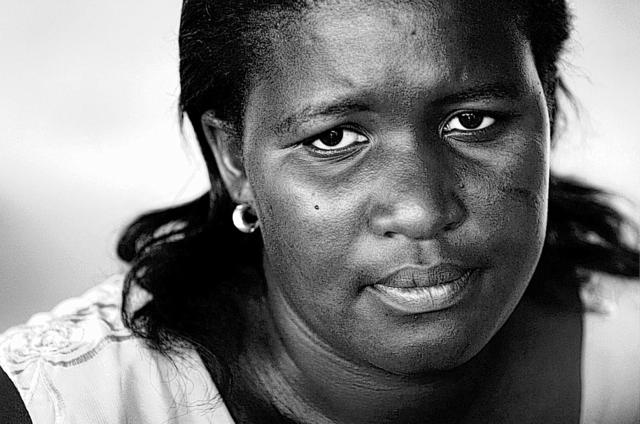Associated Press, carried in Arizona Daily Star
Arizona Daily Star [Ghana]
July 1, 2007
http://www.azstarnet.com/allheadlines/189939
Adidome, Ghana — It started before dawn, waking to the dull ache of hunger. Then the ritual sweeping of the shrine before a day in the fields. And it went on after dark, with the fetish priest forcing her to join him in his bed.
"They say we are priestesses, divinely honored to be called to serve the gods as wives, but for us it just means suffering and pain," said Juliana Dogbadzi, who was about 7 years old when her family sent her to a shrine to atone for the sins of a great-grandfather long dead.
After nearly 20 years of physical, mental and sexual abuse, with two children born of rape and the scars from beatings for previous escape attempts, Dogbadzi finally got away.
She now is part of a campaign to end a practice born of centuries of West African beliefs and found in several other African countries.
 |
| Juliana Dogbadzi, 37, a former fetish slave, was about 7 years old when she was sent to a shrine to atone for a great-grandfather's sins. Photo by Oliver Asselin |
The practice is believed to have started with offerings of animals to shrines to appease the gods for a crime committed by a family member. When a family had to atone for a murder, tradition goes, a fetish priest said an animal was not enough and demanded a virgin. Families who do not atone are believed cursed, suffering disease, famine and death. If a slave dies or a priest tires of her, the family must send a replacement. It can go on for generations.
Dogbadzi, in her late 30s, was preoccupied one recent day with how to help two freed women who could not make enough money to feed their five children. "They want to go back to the shrine. I don't have money to help them. But I must convince them that anything, just anything, is better than going back to slavery."
The practice is deeply rooted, and most of those leading the charge against it are seen as outsiders — either white Westerners or Ghanaians from a different tribe with different cultural values.
Much of the money to fight it comes from International Needs, an Australian group that liberates and educates fetish slaves, and from the U.N.
Local officials appear to turn a blind eye, with police saying they know nothing of a 1998 law that criminalizes ritual slavery in Ghana. No one has ever been arrested under the law.
"I think we have helped by enacting the law to ban the practice and we now need to look at how we can empower them," said Prosper Senyo, a local-government employee in Ghana's southeastern regional town of Adidome, who has compiled data for a U.N. International Labor Organization report on child labor.
Senyo's report painstakingly enumerates the number of children involved in fishing, copra collection and farming, but omits all mention of sex slaves. He said he had only visited two or three of the hundreds of shrines in his jurisdiction.
Ghana at least has a law. The practice continues without even that hindrance in nearby Togo, Benin and Nigeria.
Figures are hard to come by, but it is estimated there were about 5,000 fetish slaves in Ghana in 1999 and as many as 35,000 in the region. None of the figures in a variety of studies include the children of sex slaves, also considered the priests' property, believed to number in the tens of thousands in Ghana alone.
A U.N. report called Violence Against Women says 87 percent of the 2,000 sex slaves freed between 1997 and 1999 have returned to the shrines.
Priscilla Kalitsi, acting headmistress at the International Needs Vocational Training Centre in Adidome, counsels former slaves to forgive and forget. But she herself is bitter after hearing so many stories of sexual abuse and hunger.
"I don't show (the bitterness) to them (students) because if I show it the trauma will never leave them and they will never be able to forgive anybody," she said.
Dogbadzi said several of her family members had died before they committed a virgin to the Tsaduma shrine, a few miles from Adidome, in southeast Ghana where the fetish religion thrives. Dogbadzi was the fourth family member to be enslaved there, replacing a cousin who died.
She said she has forgiven her family, but cannot forgive Togbe Defia, the fetish priest who abused her for nearly 20 years, because "I was only a child when he (first) forced himself on me."
Defia refused to allow a reporter into his shrine to see if he still held slaves.
International Needs has compensated priests like Defia for the lost labor of slaves they agree to liberate. They get oxen, corn mills, fishing nets, canoes or, sometimes, money.
A fetish priest will free a slave for as little as $60, according to Vincent Azumah, a human-rights activist who has helped negotiate the release of dozens of sex slaves.
The slaves, known as trokosis, never go to school and leave their shrines only to work in the priest's fields. Once outside, escape is difficult since they are easily identifiable by raffia rope tied around their necks and a strip of cloth wrapping their breasts — that is all they are allowed to wear above the waist. If they are ill, they must treat themselves with herbs.
"Our customs do not make people suffer, they do not starve women and children, they don't rape children," Dogbadzi said through an interpreter. "It is the practice of trokosi that does that, not our culture."
Any original material on these pages is copyright © BishopAccountability.org 2004. Reproduce freely with attribution.